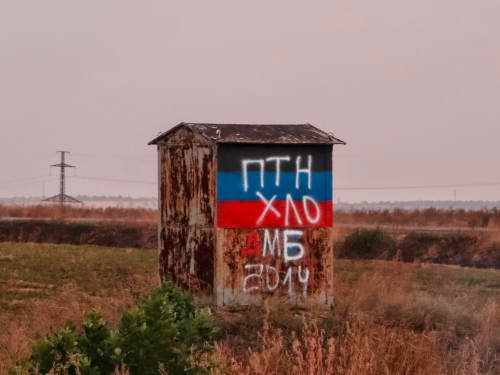
This article was originally published by the Centre for International Policy Studies (CIPS) on 18 February, 2015.
Before coming up with solutions it is first advisable to determine the nature of the problem. Right now the United States is considering sending arms to Ukraine, while here in Canada the Defence Minister, Jason Kenney, has been mulling the deployment of Canadian soldiers to train the Ukrainian Army. But is a lack of arms or training the real reason for the Ukrainian Army’s defeats?
To answer that question, it is worth looking at what has been happening in the town of Debaltsevo, where a large Ukrainian contingent, possibly several thousand strong, was encircled by rebel forces. The government in Kiev has repeatedly denied that its troops were surrounded, but even Ukrainian military journalists acknowledge that the main road out of Debaltsevo is in rebel hands and that troops of the Donetsk and Lugansk People’s Republics have captured most of the town, as well as a substantial number of prisoners. On the night of February 17-18, a large part of the garrison escaped through gaps in rebel lines, but Ukrainian sources report heavy casualties in the process. Substantial quantities of equipment have been destroyed or have fallen into rebel hands. Ukraine has suffered a serious defeat.
How did the Ukrainians end up in this mess? The answer is not a lack of weapons. They had plenty in Debaltsevo and the surrounding area. Nor is a lack of training to blame. For sure, the Ukrainian soldiers are not as well trained as those of Western armies, but neither are the rebels. The evidence suggests that those surrounded in Debaltsevo fought bravely and for the most part effectively. It is not the fault of the soldiers that they were encircled.
Rather, it is the fault of Ukraine’s highest level political and military leaders. The rebel plan to cut the supply lines to Debaltsevo was no secret. The rebels proclaimed it openly. Moreover, their plan did not succeed instantaneously, but took several weeks.
The Ukrainian high command had plenty of time to withdraw its troops to safety long before it did. Instead, it buried its head in the sand and repeatedly denied that there was a problem. Reports suggest that during the recent peace negotiations in Minsk, President Poroshenko of Ukraine and President Putin of Russia spent many hours arguing over whether Debaltsevo was encircled. Poroshenko insisted that it was not and claimed, therefore, that no provision was needed in the peace settlement for the withdrawal of Ukrainian troops. After the agreement at Minsk was signed, the rebels offered the Ukrainians safe passage out of Debaltsevo. The offer was rejected. Ukraine’s leaders had the opportunity to save their men, but they did not take it, incorrectly believing that they could still hold onto the town. They could not. Many lives were lost unnecessarily.
This is not a unique occurrence. Last July, Ukrainian soldiers were similarly surrounded in a zone which the rebels called the ‘southern cauldron’, a thin corridor about 60 kilometres long south of the cities of Donetsk and Lugansk. Again, this disaster was not only predictable but predicted. As early as the start of July, the Ukrainian General Staff warned of a coming ‘catastrophe’ and suggested that the army abandon the sector in question. It was overruled, the troops were surrounded, many were killed, hundreds more surrendered, and large quantities of equipment were lost.
In short, Ukraine’s defeats are the result of dismal leadership rather than a want of weapons or training. Unfortunately, Western countries’ obsession with Russia has deluded them into thinking that Ukraine’s problems are entirely the fault of Russian malevolence, and has blinded them into ignoring the role played by the Ukrainian government’s incompetence.
To date, the policy of Canada and its allies has been to change Russian behaviour by means of sanctions. But Ukrainian behaviour also needs changing: in particular, Kiev has to abandon all hopes of military victory and face the reality that it must negotiate directly with the rebels in order to enact the constitutional reform required in the latest Minsk agreement. Our influence on Russia is very limited. We do, however, have leverage over Ukraine, and can hope to change its behaviour. Rather than giving unconditional support, we should start trying to effect that change.
Paul Robinson is an Associate Professor at the Graduate School of Public and International Affairs at the University of Ottawa.
For more information on issues and events that shape our world, please visit ISN Security Watch or browse our resources.

